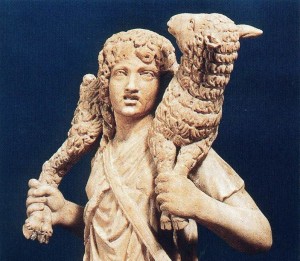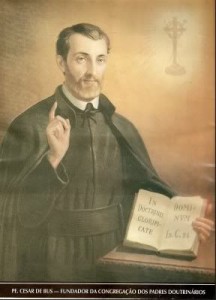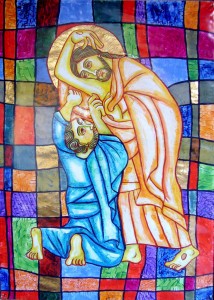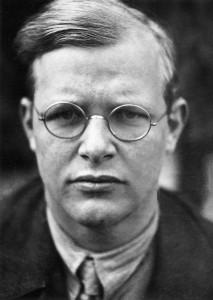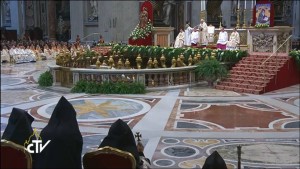 Today, Pope Francis delivered spoke the world in the presence of the President of Armenia, Serž Azati Sargsyan, Catholicos Karekin II, Catholicos Aram I, and the Catholic Patriarch Nerses Bedros XIX, of the Great Evil of killing people, the first genocide of the 20th century.
Today, Pope Francis delivered spoke the world in the presence of the President of Armenia, Serž Azati Sargsyan, Catholicos Karekin II, Catholicos Aram I, and the Catholic Patriarch Nerses Bedros XIX, of the Great Evil of killing people, the first genocide of the 20th century.
Dear Armenian Brothers and Sisters,
A century has passed since that horrific massacre which was a true martyrdom of your people, in which many innocent people died as confessors and martyrs for the name of Christ (cf. John Paul II and Karekin II, Common Declaration, Etchmiadzin, 27 September 2001). Even today, there is not an Armenian family untouched by the loss of loved ones due to that tragedy: it truly was “Metz Yeghern”, the “Great Evil”, as it is known by Armenians. On this anniversary, I feel a great closeness to your people and I wish to unite myself spiritually to the prayers which rise up from your hearts, your families and your communities.
Today is a propitious occasion for us to pray together, as we proclaim Saint Gregory of Narek a Doctor of the Church. I wish to express my deep gratitude for the presence here today of His Holiness Karekin II, Supreme Patriarch and Catholicos of All Armenians, His Holiness Aram I, Catholicos of the Great House of Cilicia, and His Beatitude Nerses Bedros XIX, Patriarch of Cilicia of Armenian Catholics.
Saint Gregory of Narek, a monk of the tenth century, knew how to express the sentiments of your people more than anyone. He gave voice to the cry, which became a prayer, of a sinful and sorrowful humanity, oppressed by the anguish of its powerlessness, but illuminated by the splendour of God’s love and open to the hope of his salvific intervention, which is capable of transforming all things. “Through his strength I wait with certain expectation believing with unwavering hope that… I shall be saved by the Lord’s mighty hand and… that I will see the Lord himself in his mercy and compassion and receive the legacy of heaven” (Saint Gregory of Narek, Book of Lamentations, XII).
Your Christian identity is indeed ancient, dating from the year 301, when Saint Gregory the Illuminator guided Armenia to conversion and baptism. You were the first among nations in the course of the centuries to embrace the Gospel of Christ. That spiritual event indelibly marked the Armenian people, as well as its culture and history, in which martyrdom holds a preeminent place, as attested to symbolically by the sacrificial witness of Saint Vardan and his companions in the fifth century.
Your people, illuminated by Christ’s light and by his grace, have overcome many trials and sufferings, animated by the hope which comes from the Cross (cf. Rom 8:31-39). As Saint John Paul II said to you, “Your history of suffering and martyrdom is a precious pearl, of which the universal Church is proud. Faith in Christ, man’s Redeemer, infused you with an admirable courage on your path, so often like that of the Cross, on which you have advanced with determination, intent on preserving your identity as a people and as believers” (Homily, 21 November 1987).
This faith also accompanied and sustained your people during the tragic experience one hundred years ago “in what is generally referred to as the first genocide of the twentieth century” (John Paul II and Karekin II, Common Declaration, Etchmiadzin, 27 September 2001). Pope Benedict XV, who condemned the First World War as a “senseless slaughter” (AAS, IX [1917], 429), did everything in his power until the very end to stop it, continuing the efforts at mediation already begun by Pope Leo XIII when confronted with the “deadly events” of 1894-96. For this reason, Pope Benedict XV wrote to Sultan Mehmed V, pleading that the many innocents be saved (cf. Letter of 10 September 1915) and, in the Secret Consistory of 6 December 1915, he declared with great dismay, “Miserrima Armenorum gens ad interitum prope ducitur” (AAS, VII [1915], 510).
It is the responsibility not only of the Armenian people and the universal Church to recall all that has taken place, but of the entire human family, so that the warnings from this tragedy will protect us from falling into a similar horror, which offends against God and human dignity. Today too, in fact, these conflicts at times degenerate into unjustifiable violence, stirred up by exploiting ethnic and religious differences. All who are Heads of State and of International Organizations are called to oppose such crimes with a firm sense of duty, without ceding to ambiguity or compromise.
May this sorrowful anniversary become for all an occasion of humble and sincere reflection, and may every heart be open to forgiveness, which is the source of peace and renewed hope. Saint Gregory of Narek, an extraordinary interpreter of the human soul, offers words which are prophetic for us: “I willingly blame myself with myriad accounts of all the incurable sins, from our first forefather through the end of his generations in all eternity, I charge myself with all these voluntarily” (Book of Lamentations, LXXII). How striking is his sense of universal solidarity! How small we feel before the greatness of his invocations: “Remember, [Lord,]… those of the human race who are our enemies as well, and for their benefit accord them pardon and mercy… Do not destroy those who persecute me, but reform them, root out the vile ways of this world, and plant the good in me and them” (ibid., LXXXIII).
May God grant that the people of Armenia and Turkey take up again the path of reconciliation, and may peace also spring forth in Nagorno Karabakh. Despite conflicts and tensions, Armenians and Turks have lived long periods of peaceful coexistence in the past and, even in the midst of violence, they have experienced times of solidarity and mutual help. Only in this way will new generations open themselves to a better future and will the sacrifice of so many become seeds of justice and peace.
For us Christians, may this be above all a time of deep prayer. Through the redemptive power of Christ’s sacrifice, may the blood which has been shed bring about the miracle of the full unity of his disciples. In particular, may it strengthen the bonds of fraternal friendship which already unite the Catholic Church and the Armenian Apostolic Church. The witness of many defenceless brothers and sisters who sacrificed their lives for the faith unites the diverse confessions: it is the ecumenism of blood, which led Saint John Paul II to celebrate all the martyrs of the twentieth century together during the Jubilee of 2000. Our celebration today also is situated in this spiritual and ecclesial context. Representatives of our two Churches are participating in this event to which many of our faithful throughout the world are united spiritually, in a sign which reflects on earth the perfect communion that exists between the blessed souls in heaven. With brotherly affection, I assure you of my closeness on the occasion of the canonization ceremony of the martyrs of the Armenian Apostolic Church, to be held this coming 23 April in the Cathedral of Etchmiadzin, and on the occasion of the commemorations to be held in Antelias in July.
I entrust these intentions to the Mother of God, in the words of Saint Gregory of Narek:
“O Most Pure of Virgins, first among the blessed,
Mother of the unshakeable edifice of the Church,
Mother of the immaculate Word of God,
(…)
Taking refuge beneath your boundless wings which grant us the protection of your intercession, we lift up our hands to you, and with unquestioned hope we believe that we are saved”.
(Panegyric of the Theotokos)
From the Vatican, 12 April 2015
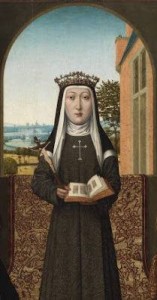 Today, the Church and the Franciscans celebrate the memory of Saint Catherine Vigri of Bologna (1413-1463). Catherine was born to an aristocratic family of Bologna; Catherine spent most of her early life in the city of Ferrara as a lady-in-waiting at the court where her father was ambassador. She Catherine received a good education, yet she decided to leave the court to join a community of women in 1426; in the early 1430’s, she and some other members of the group decided to adopt the Rule of St. Clare.
Today, the Church and the Franciscans celebrate the memory of Saint Catherine Vigri of Bologna (1413-1463). Catherine was born to an aristocratic family of Bologna; Catherine spent most of her early life in the city of Ferrara as a lady-in-waiting at the court where her father was ambassador. She Catherine received a good education, yet she decided to leave the court to join a community of women in 1426; in the early 1430’s, she and some other members of the group decided to adopt the Rule of St. Clare.
